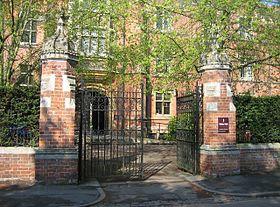| Ridley Hall | |
|---|---|
| Theological College House of Cambridge Theological Federation | |
 | |
| Location | Cambridge, England |
| Motto | Martyrii Memores (Latin) |
| Motto in English | Mindful of Martyrdom |
| Established | 1881 |
| Named for | Nicholas Ridley |
| Sister college | Wycliffe Hall, Oxford |
| Principal | Michael Volland [1] |
 | |
| Website | www.ridley.cam.ac.uk |
Ridley Hall is a theological college located in Sidgwick Avenue in Cambridge in the United Kingdom, which trains men and women intending to take Holy Orders, as deacon or priest of the Church of England, and members of the laity working with children and young people, as lay pioneers and within a pastoral capacity such as lay chaplaincy.
History
Ridley Hall was founded in 1881 and named in memory of Nicholas Ridley, a leading Anglican theologian and martyr of the sixteenth century. The college's first principal was the theologian Handley Moule, later Bishop of Durham.[2]
Present day
Ridley Hall offers several Common Award qualifications, accredited by Durham University. Although not a constituent college of the University of Cambridge, the school has ties with the university's Faculty of Divinity. Some students who are also in a constituent college of the university can be awarded qualifications by Cambridge.[3] Ridley Hall forms part of the Cambridge Theological Federation, along with Westcott House, Westminster College, the Institute for Orthodox Christian Studies, and others.
Ridley Hall's teaching tends towards an evangelical theology. It is one of four Church of England theological colleges that self-identify as "Open Evangelical", the others being St John's College in Nottingham, Trinity College in Bristol, and Cranmer Hall in Durham.[4][5]
The current principal of Ridley Hall is Michael Volland, who succeeded Andrew Norman, who moved on to become Director of Ministry and Mission in the Diocese of Leeds.
It publishes an academic journal, Anvil.[6]
Notable staff and alumni
- Jonathan Bailey
- Richard Bauckham
- Jeremy Begbie
- Edward Armstrong Bennett
- Andrew Briggs
- Arthur Buxton[7]
- Christopher John Cocksworth
- Timothy Dudley-Smith
- Dick Lucas
- Michael Nazir-Ali
- Mike Ovey
- Gavin Peacock
- John Sentamu
- David Sheppard
- John Stott
- John Waine
- David Watson
- David Wenham
- Andrew White
List of principals
Thus far, all the principals have been ordained Anglican clergy.
- 1881–1899 (res.): Handley Moule
- 1889–1907 (res.): Thomas Drury
- 1907–1927 (res.): Arthur Tait
- 1927–1945 (res.): Paul Gibson
- 1945–1950 (res.): Falkner Allison
- 1951–1963 (res.): Cyril Bowles
- 1963–1971 (res.): Michael Hennell
- 1971–1972 (res.): Francis Palmer
- 1973–1978 (res.): Keith Sutton
- 1978–1991 (res.): Hugo de Waal
- 1992–2001 (res.): Graham Cray
- 2001–2008 (res.): Christopher Cocksworth
- 2009–2016 (res.): Andrew Norman
- 2016–present: Michael Volland
References
- ^ [1]
- ^ "Handley Carr Glyn Moule" in Samuel Macauley Jackson, ed., The New Schaff-Herzog Encyclopedia of Religious Knowledge, Volume 8 (New York and London: Funk and Wagnalls, 1910), p. 30
- ^ "Study for the BTh on our ordained ministry programme". Bachelor of Theology for Ministry (BTh). Retrieved 27 January 2020.
- ^ FAQs - What does "Open Evangelical" actually mean? at Ridley Hall website. Retrieved on September 9, 2006.
- ^ Kings, 2003. "Canal, River and Rapids: Contemporary Evangelicalism in the Church of England" Archived 2012-08-04 at Archive.today by Graham Kings, published in the journal Anvil Vol 20 No 3, September 2003, pp 167–184. Retrieved on September 9, 2006.
- ^ "Hall web-site". Ridley.cam.ac.uk. Retrieved 11 May 2019.
- ^ "Buxton, Arthur", in Crockford's Clerical Directory (1930), p. 190
External links
![]() Media related to Ridley Hall, Cambridge at Wikimedia Commons
Media related to Ridley Hall, Cambridge at Wikimedia Commons